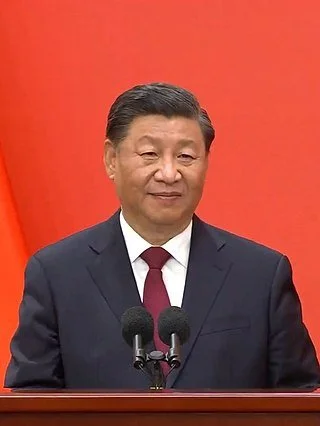The Human Rights Repercussions of Xi's Historic Third Term
At the Chinese Communist Party’s 20th congress on 23 October, Xi tightened his grip on power and secured a historic third term as China’s leader.
This was a shock for many – China had previously set a term limit at a maximum of two terms. Before Xi, some even believed that China would gravitate towards a democratic system. However, Xi has extended his term indefinitely, as well as stacking his inner circle with his allies and eliminating rivals. There will be no way to know what Xi’s reasons for this were until he leaves office, but one hypothesis is that he aims to avoid this democratised China.
Xinjiang province, which literally translates to 'new border', is the westernmost area of China and comprises about one-sixth of all Chinese territory. Although they have been part of China for decades, the original inhabitants and owners of this area, the Uyghurs, have never ceased in their fight for independence. The Uyghur ethnic group is a predominantly Turkic-speaking group that are centralised around the Northwest region of Xinjiang. As the world moves towards a more liberal and democratised philosophy, one Turkish scholar, Erkin Ekrem, says that 'China wants to wipe out and/or weaken the Uyghurs from the Earth before it transitions to that democratic era, making them unable to raise their heads in a democratic China in the future.'
Throughout Xi’s term, China has consistently focused on eliminating the Uyghur 'issue.' In fact, he attributes his need to stay in power to the Chinese proverb that you can 'not change horses while crossing the river;' China should not change leaders while still in the middle of handling the Uyghur problem. In April 2014, Xi visited Xinjiang province, where most Uyghurs live, and secretly set in motion a crackdown on Uyghurs and other Muslim minorities in the name of 'fighting terrorism and separatism.' This resulted in the detention of more than a million Muslims, mostly Uyghurs, but also ethnic Kazakhs and Uzbeks, in reeducation camps since 2017. The US has called this a 'genocide,' while the United Nations calls it 'crimes against humanity.' Satellite images show 39 camps that almost tripled in size between 2017 and 2018. Despite the Chinese government’s claims that these are harmless 'vocational education and training centres,' these camps force their detainees to pledge their loyalty to China and the CCP, renounce Islam, and withstand sexual abuse and torture. The detainees are also refused medical care, food, and proper living conditions. Chinese officials deny the infringement on their rights and say that they closed the camps in 2019, which satellite images have proven to be untrue.Experts estimate that these reeducation efforts started in Xinjiang in 2014 and were drastically expanded in 2017.
China has also introduced widespread high-tech mass surveillance systems in the province. Xinjiang authorities conduct compulsory mass collection of data, such as voice samples and DNA, and use 'artificial intelligence and big data to identify, profile, and track everyone in Xinjiang.' These systems have enabled the authorities to implement differentiated restrictions based on their perceived 'trustworthiness' or threat to the government.
Xi’s belligerence has already stoked resentment overseas. Among the first people to congratulate Xi were North Korean dictator Kim Jong Un and Russian president Vladimir Putin. The heads of the American FBI and the British MI5 jointly declared that China was the 'biggest long-term threat to our economic and national security.' Additionally, Xi has announced a 'limitless partnership' with Putin earlier this year, even since Russia has seen worldwide disapproval since its invasion of Ukraine. When Xi came into power in 2013, Only 40% of Americans had a negative view of China; this number has increased to 82 percent in 2022. Since Xi’s reign, the US has restricted accessibility for Chinese people – visas are limited and students aren’t able to hold some jobs.
The abuse of the Uyghur Muslims is just one example of how China has experienced a growing level of authoritarianism ever since Xi came to power. He has continually cracked down on dissenting views, including Uyghur Muslim beliefs, but also other religious beliefs and support of his enemies, namely the United States. Since his presidential term began, Tibetan and Uyghur schools have been forbidden from teaching their languages in schools. Activists predict that in his third term, he will become even bolder, and Xi states that this will be a 'new era' for China. Some worry that Xi’s election will set the stage for a new Cold War. 'All Southeast Asian countries now feel pressure to take sides between the U.S. and China,' says former Thai Prime Minister Abhisit Vejjajiva. 'There’s clearly a real risk for all the other countries in the world to feel that we’re now falling back into two camps.'
What does this mean for the rest of the world? In the words of Professor Steve Tsang of the University of London, ‘the future is bright for Xi Jinping, and dark for everyone else.’
Image courtesy of China News Service via Wikimedia Commons, © 2022, some rights reserved.
The views and opinions expressed in this article are those of the author and do not necessarily reflect those of the wider St. Andrews Foreign Affairs Review team.



